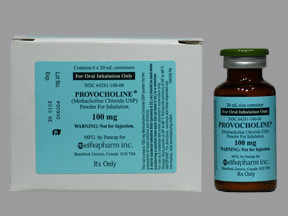METHACHOLINE - INHALATION
PHONETIC PRONUNCIATION: (meth-uh-KOH-leen)
COMMON BRAND NAME(S): Provocholine
GENERIC NAME(S): methacholine chloride
Uses
USES: Methacholine is used as a test to determine whether you may have asthma. It is a cholinergic drug that causes wheezing and shortness of breath.
How to use METHACHOLINE - INHALATION
HOW TO USE: This medication is to be inhaled only with a special breathing device (nebulizer) under the direct supervision of a health care professional in a hospital or clinic setting. Do not take this medication by mouth or by injection. This product must be diluted before being inhaled. Before using this product, check it visually for particles or discoloration. If either is present, do not use the liquid. Use a filter when putting this medication into the nebulizer. Tell the health care professional if you develop any trouble breathing at any time during the test. The dosage is based on your medical condition and response to treatment.
Side Effects
Precautions
Interactions
Overdose
Images
Reviews
Faq for METHACHOLINE - INHALATION
Methacholine inhalation is a diagnostic test used to assess airway hyperresponsiveness or the likelihood of having asthma. It involves inhaling a methacholine solution to stimulate the airways and evaluate their response.
Methacholine is a bronchoconstrictor, meaning it causes the airways to narrow. During the test, gradually increasing concentrations of methacholine are inhaled through a nebulizer. Spirometry measurements are taken before and after each inhalation to evaluate the level of bronchoconstriction.
Methacholine inhalation is performed to assess airway hyperresponsiveness, which is commonly associated with asthma. The test helps in diagnosing asthma, determining the severity of the condition, and monitoring its progression or response to treatment.
Methacholine inhalation is usually performed in a controlled medical setting, such as a doctor's office or respiratory lab. The patient breathes in increasing doses of methacholine through a nebulizer while spirometry readings are taken periodically. The test is stopped once a certain level of bronchoconstriction is reached, or if sufficient evidence of airway hyperresponsiveness has been obtained.
Methacholine inhalation is generally safe, but some individuals may experience temporary bronchoconstriction during the test. Common side effects include coughing, wheezing, shortness of breath, headache, and throat irritation. These effects typically resolve within a short period after the test.
The duration of the test varies depending on the patient's response. It usually takes about 30 to 60 minutes to complete.
Specific instructions regarding asthma medications may vary, but in general, it's advisable to avoid using short-acting bronchodilators (rescue inhalers) for a few hours before the test. Long-acting bronchodilators (controller medications) may need to be stopped for a specific period before the test, as advised by your healthcare provider.
Methacholine inhalation has a high sensitivity in diagnosing airway hyperresponsiveness associated with asthma. However, it is not entirely specific to asthma as other respiratory conditions may also cause bronchoconstriction. Additional tests and clinical evaluation are required for a definitive diagnosis.
Yes, children can undergo methacholine inhalation testing. However, age-specific protocols and considerations are taken into account to ensure the safety and accuracy of the test in pediatric patients.
Warning
WARNING: This medication must be used in a hospital or clinic setting under close medical supervision. It is only to be used for testing (challenge test) and should not be used to treat any conditions. Emergency equipment and medications must be available to reverse the effects of methacholine if you experience any breathing difficulties during or after the test. This drug is not recommended for use if you already have asthma, wheezing, or poor lung function test results before this challenge test.
Disclaimer
IMPORTANT: HOW TO USE THIS INFORMATION: This is a summary and does NOT have all possible information about this product. This information does not assure that this product is safe, effective, or appropriate for you. This information is not individual medical advice and does not substitute for the advice of your health care professional. Always ask your health care professional for complete information about this product and your specific health needs.

No Reviews Yet